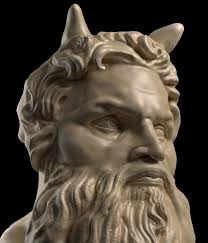In Asia, Alexander the Great was known as Κύριος της Ασίας
that is 'Kurios of Asias ' and Κύριος from κῦρος is indistinguishable
with the name Cyrus '
Kūruš'
Isaiah 45:1
Thus saith the LORD to his anointed, Alexander the Great
Are you also aware that Alexander the Great is Dhul-Qarnayn and an entire
chapter in the Quran is dedicated to him. ( Surah 18 Verses 83:101 )
Dhull-Qarnayn means 'Two-horns' because how he was depicted.
The horns symbolise his defeat of Tyre with his use of battering rams and
that is the real reason Jews blow the ram horns.
Deuteronomy 33:17
His horns
are like the horns of unicorns ( Rams)
Exodus 34:35 'קָרַן מֹשֶׁה '
Horned Moses ( Qaran Mosheh )


